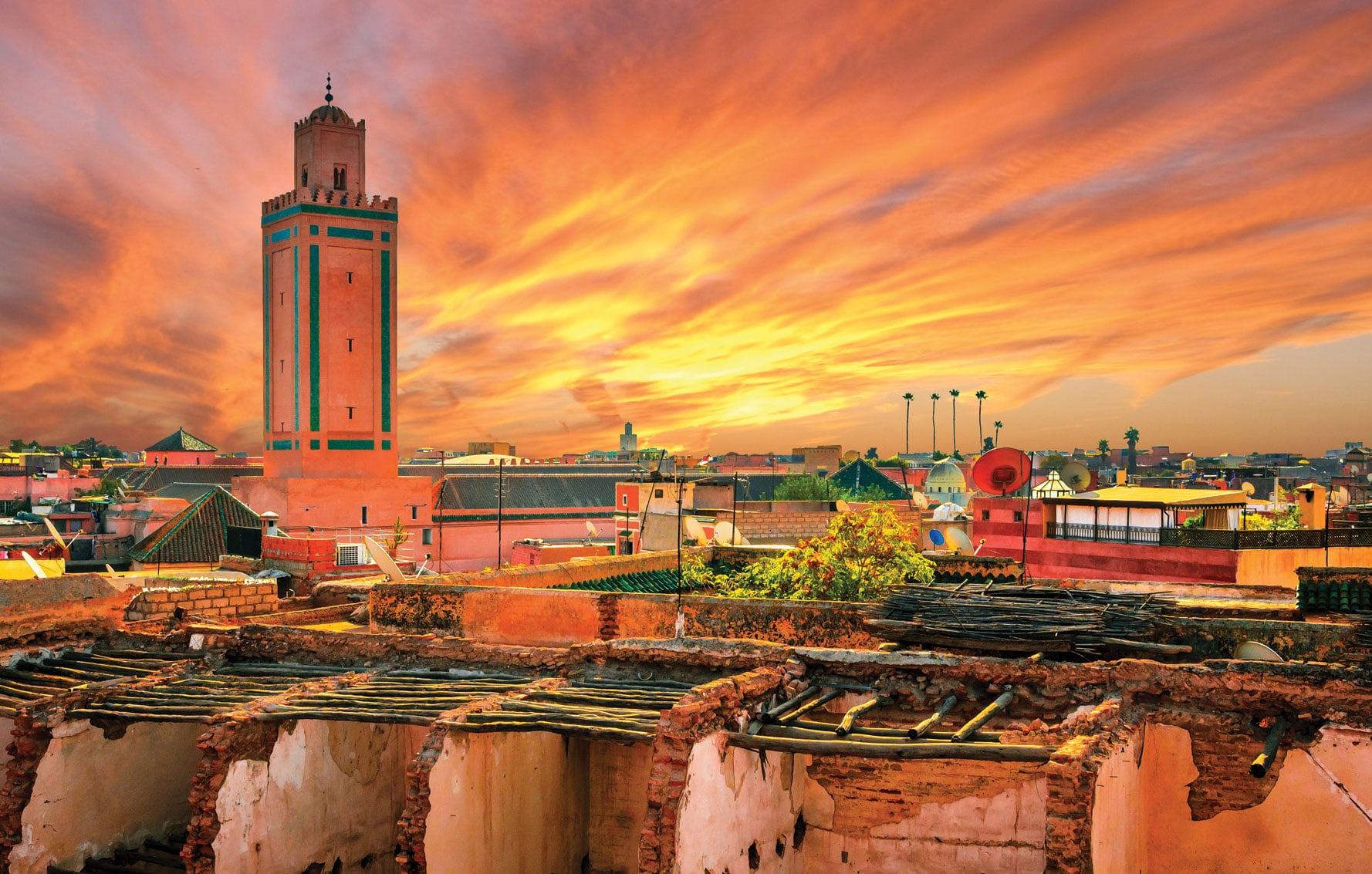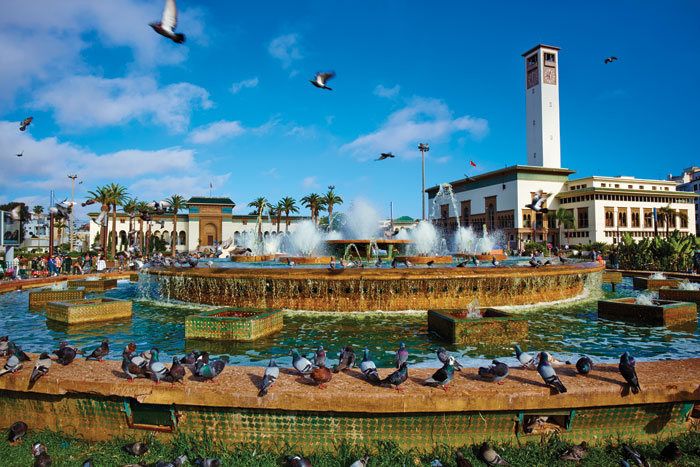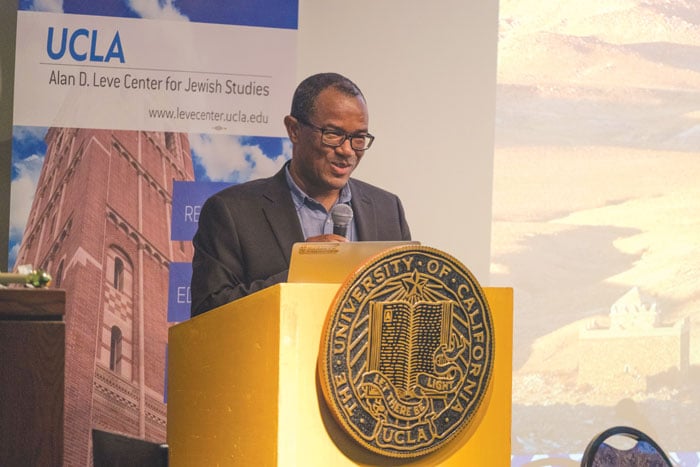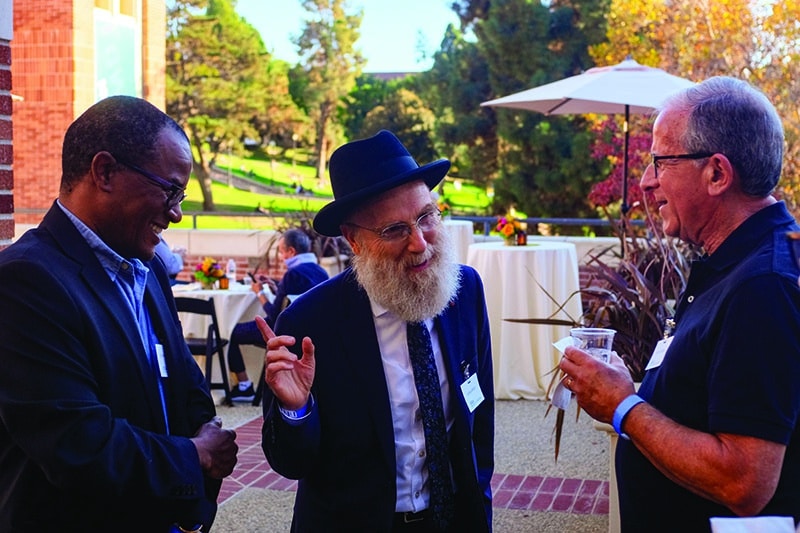 Olena_Z/Getty Images
Olena_Z/Getty Images The first thing that struck me about Aomar Boum was how he conversed so naturally with my mother in Arabic, as if they had known each other for years. I had heard about Boum and his interest in Moroccan Jews, so I reached out and invited him to our Shabbat table while my mother was visiting from Montreal.
You would think it was a family reunion. My mother’s cuisine reminded him of his own mother’s, and even our Sephardic Shabbat melodies sounded familiar. That night, we bonded as Moroccan “brothers,” and have been ever since.
That was about five years ago.
A few months later, Boum wrote about his journey in a Jewish Journal column: “Growing up as a practicing Muslim in a Moroccan village, I never could have imagined that I would, one day, do research with the United States Holocaust Memorial Museum on Vichy and Nazi policies in North Africa, or that I would become affiliated with the UCLA Center of Jewish Studies.”
So, what motivated a practicing Muslim to become a world-renowned expert on the Jews of Morocco and help launch the new Moroccan Jewish Studies center at UCLA?
It turns out Boum had more in common with Moroccan Jews than language, cuisine and melodies. He also identified with the “foibles of a minority.”
“I experienced discrimination in my youth,” he wrote in the Journal. “In southern Morocco, where I grew up, race is a factor in determining social and economic status. The Haratine, who have a darker skin color and are seen as socially inferior, farmed lands owned by the local Maraboutic families known as Shurfa (historically light-skinned). For decades, my father served these families as a day laborer. I grew up affected by this.”
The Jews of Morocco have never forgotten how King Mohammed V protected them during World War II, a gratitude I inherited from my parents.
But this kinship with Jews based on a shared minority status was only part of his motivation. Boum was also moved by the deep attachment Moroccan Jews have to their Moroccan heritage, as well as their affection for the monarchy. The Jews of Morocco have never forgotten how King Mohammed V protected them during World War II, a gratitude I inherited from my parents.

(Tuul & Bruno Morandi/Getty Images)
Indeed, I got my own taste of this special bond, first growing up in Casablanca and then immersed in the Jewish Moroccan community of Montreal. Over the years, I would listen to family elders wax nostalgic about their cozy lives back in Casablanca, hearing about all the things they missed and the countless stories that stayed fertile in their memories.
Memory, of course, can make us idealize the past, especially if the present sees us shivering in Canadian winters. But the Jewish attachment to Morocco goes beyond the romance of nostalgia or the beautiful Mediterranean climate. Perhaps above all, the Jews of Morocco recall fondly the intimacy of their Jewish neighborhoods.
That is the soul of their attachment: In Morocco, Jews felt free to live as Jews.
That is the soul of their attachment: In Morocco, Jews felt free to live as Jews.
My parents and their ancestors practiced freely their beloved Jewish traditions and rituals, which was the spiritual glue that held their families and communities together. I remember well the hustle and bustle of Shabbat preparations in our Casablanca neighborhood, the kosher butchers and grocers, the rabbis and Hebrew schools, the many little synagogues, the sheer Jewishness of the atmosphere in a Muslim country.
The fact that Jews historically were not on equal footing with Arabs—we had the status of protected, non-Muslim subjects, known as dhimmis—was more than offset by the freedom to live Jewish lives in a country where the King had our backs.
For many of us, the highlight of that Jewish life was the magical night of Mimouna, when Jewish homes would open their doors with elaborate sweet tables to mark the end of Passover. Notably, it was our Arab neighbors who helped us gather the flour and other ingredients during the last hours of the holiday.

Our story was not all rosy. I also heard more than a few stories of poverty and hardship. Jews lived in Morocco for centuries, and throughout long periods of co-existence with Arabs there were also incidents of violence and hostility. As regrettable as they were, they didn’t come to define the Jewish story in Morocco. The deep bonds of culture and neighborliness have a way of sweetening both experience and memory.
The echoes of that culture still resonate throughout the Moroccan Jewish Diaspora, especially through language and music. I have memories of Saturday night parties my parents would host in our basement during Montreal winters, and besides the deep-fried delicacies, what I remember most is a Jewish man who would tell jokes only in Arabic—and had the guests in stitches. They might as well have been in Casablanca.
Today, when I attend one of our family weddings or parties, my favorite song is not “Havah Nagila” but “Ya Rayah” or any song with habibi in it. Seriously, when Arab music comes on, Moroccan Jews go crazy. The driving beats and wailing melodies quicken their pulses, transporting them not just to their past but to the dance floor.
It’s the music Moroccan Jews grew up with, but what’s funny is that many of the kids of the new generation who weren’t born in Morocco (like my kids) also love it. Maybe culture has a genetic component.

It’s true that we’re living at a time of great cultural exchanges, and nowhere is this more apparent than in Los Angeles, where Jews of multiple nationalities have gathered. I have come to love many of the customs of my Ashkenazi brethren, just as they have come to love many of our Sephardic customs.
And yet, with all of that cultural mingling, my Moroccan heritage still has a special pull on me. The melodies I might hear in a mosque, for example, sound more familiar to me than the European-influenced melodies I’ve grown accustomed to in Ashkenazi synagogues. That is the gravitational force of memory; it’s not something we can control.
Two years ago, those memories came alive at a glittering gala in Beverly Hills organized by Em Habanim Sephardic Congregation. The King of Morocco, Mohammed VI, sent a large delegation led by his sister, Princess Lalla Hasnaa, to honor the Moroccan Jews of the Diaspora and celebrate the country’s longstanding respect toward its Jewish community.
Professor Boum, one of the organizers, graciously invited me to say a few words. Looking at the Royal table, I expressed gratitude for the influences on my Judaism. “I grew up with the Judaism of the sun,” I remember telling them. “A Judaism of optimism, of neighborhoods and rituals, of deserts and beaches, of holiness and faith. For all of that, I give much credit to Morocco and to my Moroccan heritage.”
On Sunday, November 14, More than 100 guests gathered for the official launch of the Alan D. Leve Center for Jewish Studies’ new Moroccan Jewish Studies initiative, which Professor Boum will run.
It is this rich heritage that Professor Boum is so familiar with, and has dreamed of bringing to UCLA ever since we first met at that Shabbat dinner. On Sunday, November 14, at an event at the UCLA Fowler Museum called Moroccan Heritage Day, that dream came true. More than 100 guests gathered for the official launch of the Alan D. Leve Center for Jewish Studies’ new Moroccan Jewish Studies initiative, which Professor Boum will run.
In his opening remarks, Chancellor Gene Block noted that “this initiative presents an important opportunity to advance understanding of the cultures and history of Moroccan Jews as well as Jews from North Africa more generally. These histories often do not get the kind of scholarly attention that they deserve, but I am certain that the Leve Center will help address that imbalance and establish itself as a leader in this field.”
He added that “the new Moroccan Jewish Studies initiative will build upon the other vital efforts of the Leve Center, the Amado Program, the UCLA Viterbi Family Program and the Nazarian Center in the areas of Jewish Studies, Sephardic Studies, Mediterranean Jewish Studies, Israel Studies, the study of Hebrew and Yiddish, and more.”

Professor of History Sarah Abrevaya Stein, who has been heavily involved in this field of study and in the creation of the new initiative, noted that it represents “the culmination of years of teaching undergraduates and graduate students in the social sciences and humanities, of public programming on the Jewish communities of Morocco and North Africa, and of scholarly work—including the production of books, articles, online exhibits, and translations of scholarship in the field into Hebrew, Arabic, and French.”
Many of us in the Moroccan Jewish community of Los Angeles are eager to see the fruits of this new initiative. An interesting question will be: How much emphasis will be placed on the past and how much on the present?
Academia has a natural tendency to look at the past: What is history if not the study of the past? The event on Nov. 14 did just that, with an impressive presentation by McGill University Professor Christopher Silver, entitled, “Etched in Time and Grooves: The Sounds of Moroccan Jewish History.”
Silver’s presentation was followed by an Andalusian music concert with Abderrahim Souiri and Moshe Louk that harked back to the instruments and melodies of our ancestors. Both the presentation and the concert imbued the event with a nostalgic tone, which clearly pleased the Moroccan Jews in the audience. We all felt the power of memory—especially when music is involved, it stirs the spirit.
The Moroccan Jewish story, however, goes beyond its rich and colorful past. It is also a story that is unfolding in the present. New memories are being created, some we never thought possible.
Fifty years from now, I can imagine a history professor giving a presentation about “that pivotal year in 2021 when Morocco normalized relations with the Jewish state of Israel as part of the Abraham Accords.”
Fifty years from now, I can imagine a history professor giving a presentation about “that pivotal year in 2021 when Morocco normalized relations with the Jewish state of Israel as part of the Abraham Accords.”
One can’t overstate the historic nature of these accords. The geopolitics of the Middle East and North Africa have been marked for so long by violence and conflict that it’s hard to suspend our skepticism to hear some good news. The Abraham Accords are genuine good news.
Within a few months, direct flights have started between Israel and Morocco; economic, diplomatic and security agreements have been signed and mutual cooperation and even friendship has set in. With the significant number of Israeli Jews who hail from Morocco, this unfolding first draft of history will be fascinating to watch.

Meanwhile, a short distance from the Fowler Museum where we celebrated Moroccan Heritage Day, another unlikely story of Moroccan Jewry is unfolding: A Sephardic rabbi with Moroccan roots, Rabbi Daniel Bouskila, is the spiritual leader of an Ashkenazi synagogue. This is a trailblazing event.
He was chosen, according to the website of the Westwood Village Synagogue, because he is “widely known in the Jewish community for his dynamic lectures, thought-provoking sermons and creative articles on a wide variety of topics.”
This example of embracing a Sephardic leadership voice by the Ashkenazi community, which has perennially dominated the Jewish establishment in America, is a welcome and long overdue development. That will also be fascinating to study and watch.

Professor Boum is well aware of these and other developments. When we spoke recently, he went out of his way to tell me how he planned to balance the past with the present: the study of ancient Jewish communities in Morocco with the study of their modern descendants in the Diaspora, both in Los Angeles and elsewhere.
In other words, he told me, the center won’t live in an academic bubble. It will seek the feedback of the community and become a place of active engagement where the past and the present will dance together and be studied, celebrated and discussed.
A lot of Moroccan Jews I’ve spoken to over the years have told me that Los Angeles, with its desert and ocean climate, reminds them of Casablanca. Similarly, when I see my bustling Pico-Robertson neighborhood preparing for Shabbat and Jewish holidays, it also reminds me of Casablanca, save perhaps for the community oven where Jews would bring their dafina, our version of the Ashkenazi cholent.
Professor Boum has devoted a lifetime to these memories, authoring several books on the subject. In Los Angeles, and at UCLA, he has found an ideal home to bring these books to life and these stories to the world.
From his little village in the south of Morocco to the Westwood village today, this practicing Muslim is as integral to the Moroccan Jewish story as any Moroccan Jew. I’m sure that my mother would love to tell him this—in Arabic.























 More news and opinions than at a Shabbat dinner, right in your inbox.
More news and opinions than at a Shabbat dinner, right in your inbox.